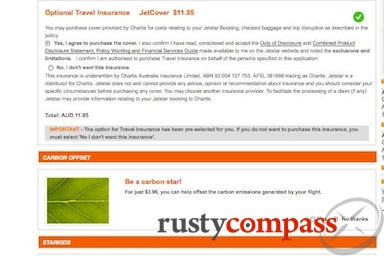I immediately checked the booking process and discovered that users of the Jetstar website are offered a range of “opt in” check boxes like accommodation, car hire. carbon offsets and more. One item on the site, travel insurance, requires a user “opt out”. I’d failed to meticulously check that every box was “opt in” and had unwittingly purchased insurance - at best, poor processes at Jetstar, at worst, a cynical money grab from travellers. Oh, and yes, I should have checked more closely as well.

Photo: A long list of "opt ins" include parking, carbon offsets, Starkids etc etc. Only insurance is "opt out"....
Once I realised what had happened, I despatched a complaint via the Jetstar website demanding the cancellation of the insurance and a refund. This was still several days before my scheduled departure.
The Jetstar response was worse than the poor practice that led to the initial complaint.
Some weeks later, I received a letter from Jetstar advising that as my complaint concerned insurance, I should contact the insurer. This was not an issue for Jetstar, I was advised.
My complaint had not been properly read. I was concerned about the Jetstar website and its default inclusion of insurance, not the insurance company.
Frustrated, I went back online seeking a proper response.
A week or more later, I received a call from a Jetstar customer service representative - let's call him N. The conversation began very amicably. I wrongly assumed the issue would be quickly resolved and my insurance purchase refunded. I asked N how Jetstar could justify such poor online booking practices? He told me that this process was instituted at the request of customers. I listened incredulously as he explained that Jetstar had received complaints from customers when insurance was not a default inclusion in the booking process.
I found this explanation fairly difficult to swallow and mentioned to N that the internet provides plenty of means for Jetstar to ensure that travellers don’t overlook insurance while still requiring that they opt in to purchase (the same way that sites require that purchasers confirm that they’ve read terms and conditions).
At the start of my conversation with N, as is customary with large corporations, I was asked for my consent to record the conversation and duly gave it. Having heard N’s explanation of the Jetstar policy, I thought I might balance things up and ask for his consent to record it for my records. At this point N became very agitated and refused consent. I then asked him to repeat the Jetstar position so that I could transcribe it accurately. I told him I wanted to avoid any misrepresentation of his response. At this point he told me the conversation was over and terminated the call.
It was a peculiar response from a company from whom customers should be able to expect clear, confident responses to complaints. And, is it reasonable for a company to record conversations and not allow a consumer the same right?
Still unsatisfied and disappointed at having the call terminated, I went online again and expressed my concerns. A week or more later, I received another call - no real offers but very politely conducted. There was no genuine effort to justify the confusing Jetstar “opt in” “opt out” protocols - they’re impossible to justify - just certainty from their representative that Jetstar was in the right. I had accepted the terms and conditions at the time of purchase I was told - end of story.
So, what would be a better approach to these issues from the airline? Well, it’s not rocket science. I doubt Jetstar is unaware of these protocols but let’s spell them out again -
* Online businesses should make certain that customers have knowingly purchased everything they are charged for. This means an “opt in” for all additional services. A mix of “opt in” and “opt out” services such as exists on the Jetstar website is especially confusing and poor online practice. The web offers plenty of mandatory pop up options should Jetstar want to ensure passengers properly consider insurance at the time of ticket purchase.
* I was also surprised to note that while Jetstar’s online complaints processes require that complainants lodge their concerns at the site (not via email), customers don’t receive a copy of their lodgment when the receipt of the complaint is confirmed via email. Best online practice (eg. Telstra and many others) would ensure that these messages are included in the confirmation email since many users will type their complaint directly into the web interface and this will be their only copy.
For travellers, watch out for these poor practices and write out your complaints before loading them to a website so you’ll have a copy. When a customer service rep asks for permission to record the conversation, try asking them for the same right and see what they say.
For regulators - shouldn’t we demand all services sold online be “opt in”? The web offers plenty of “opt in” measures for companies wanting to ensure consumers reasonably consider items like insurance.
For the travel industry - as the internet becomes an increasingly dangerous world of scamming, fraud and unethical practices, why don’t big players like Jetstar, Virgin, Qantas and big tour operators agree some best practice web protocols that give travellers confidence in the integrity of their online purchases?
It’s pretty grim when Jetstar, owned by Qantas, sets such a low bar for ethical internet practices. It’s a real invitation for smaller travel industry players to test the ethical edges even more brazenly. We expect and deserve better Jetstar!





There are no comments yet.